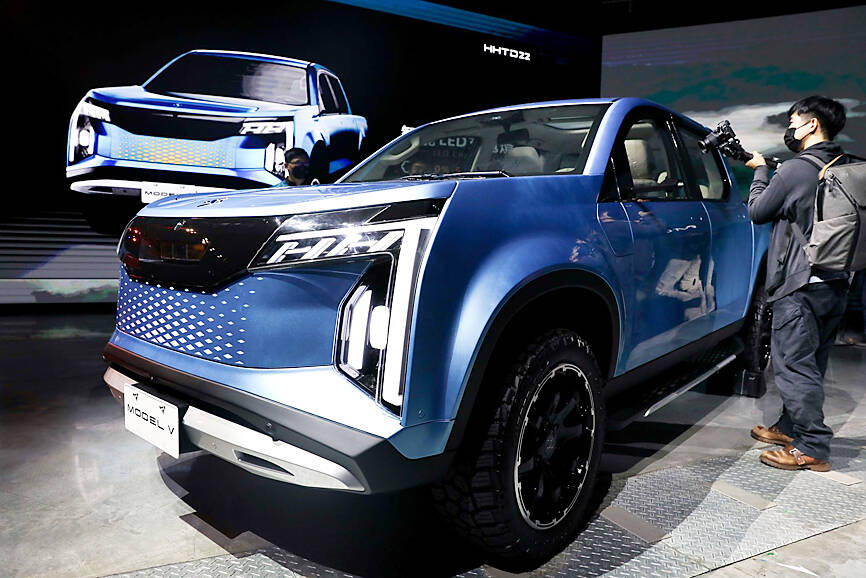Sales of fully electric vehicles (EVs) in Taiwan are to experience rapid growth over the next three years, expecting to account for about 30 percent of new vehicle sales as early as next year, jumping from 15.2 percent last year, the Industrial Technology Research Institute (ITRI, 工業技術研究院) said yesterday.
Sales of new EVs in Taiwan this year are to surge 31 percent year-on-year to 89,000 units, comprising about 20.3 percent of total sales of 438,000 new vehicles, the ITRI said.
However, that would be a 2.67 percent reduction in Taiwan’s vehicle market from an aggregate of 450,000 units last year, it said.

Photo: I-Hwa Cheng, Bloomberg
With a new model from Luxgen Motor Co (納智捷汽車) to be introduced next year, the ITRA said it expects new EV sales to rise 24.7 percent annually to 111,000 units next year.
Luxgen, Yulon Motor Co’s (裕隆汽車) own-brand car vendor, plans to launch its first all-electric sports utility vehicle, the Luxgen n7, next year.
The company has received more than 25,000 pre-orders for the vehicle, which is to be built using Foxtron Vehicle Technologies Co’s (鴻華先進) model C prototype.
New EV sales are to comprise 24 percent of total new vehicle sales next year and reach about 29.6 percent in 2024 after seeing a 22.52 percent year-on-year growth to 136,000 units, the ITRI said.
Overall new vehicle sales are to grow 2 percent to 458,000 units in 2024, it added.
With EV sales growing rapidly, Taiwan should build a resilient power grid given that the vehicles are likely to create a massive demand for electricity, ITRI president Edwin Liu (劉文雄) said.
There are expected to be 519,000 EVs on the road in 2030, consuming about 1.2 billion kilowatt hours each year, he said at a seminar in Taipei yesterday, citing Ministry of Transportation and Communications data.
Liu proposed adopting vehicle-grid integration technology to achieve Taiwan’s decarbonization and EV adoption goals and power requirements by 2050, after California launched a similar project.
The technology stabilizes a grid’s power supply through bidirectional charging, he said.

Vincent Wei led fellow Singaporean farmers around an empty Malaysian plot, laying out plans for a greenhouse and rows of leafy vegetables. What he pitched was not just space for crops, but a lifeline for growers struggling to make ends meet in a city-state with high prices and little vacant land. The future agriculture hub is part of a joint special economic zone launched last year by the two neighbors, expected to cost US$123 million and produce 10,000 tonnes of fresh produce annually. It is attracting Singaporean farmers with promises of cheaper land, labor and energy just over the border.

US actor Matthew McConaughey has filed recordings of his image and voice with US patent authorities to protect them from unauthorized usage by artificial intelligence (AI) platforms, a representative said earlier this week. Several video clips and audio recordings were registered by the commercial arm of the Just Keep Livin’ Foundation, a non-profit created by the Oscar-winning actor and his wife, Camila, according to the US Patent and Trademark Office database. Many artists are increasingly concerned about the uncontrolled use of their image via generative AI since the rollout of ChatGPT and other AI-powered tools. Several US states have adopted

KEEPING UP: The acquisition of a cleanroom in Taiwan would enable Micron to increase production in a market where demand continues to outpace supply, a Micron official said Micron Technology Inc has signed a letter of intent to buy a fabrication site in Taiwan from Powerchip Semiconductor Manufacturing Corp (力積電) for US$1.8 billion to expand its production of memory chips. Micron would take control of the P5 site in Miaoli County’s Tongluo Township (銅鑼) and plans to ramp up DRAM production in phases after the transaction closes in the second quarter, the company said in a statement on Saturday. The acquisition includes an existing 12 inch fab cleanroom of 27,871m2 and would further position Micron to address growing global demand for memory solutions, the company said. Micron expects the transaction to

A proposed billionaires’ tax in California has ignited a political uproar in Silicon Valley, with tech titans threatening to leave the state while California Governor Gavin Newsom of the Democratic Party maneuvers to defeat a levy that he fears would lead to an exodus of wealth. A technology mecca, California has more billionaires than any other US state — a few hundred, by some estimates. About half its personal income tax revenue, a financial backbone in the nearly US$350 billion budget, comes from the top 1 percent of earners. A large healthcare union is attempting to place a proposal before